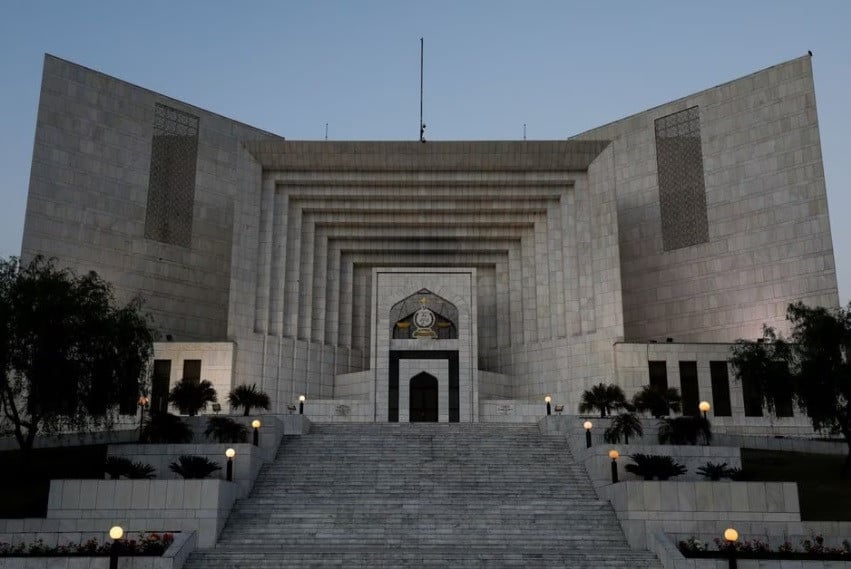
The Supreme Court has held that not providing ample opportunity of defence and depriving an accused officer from right of cross-examination to departmental representative who lead evidence and produced documents against the suspect is also against Article 10-A of the Constitution in which the right to a fair trial is a fundamental right.
"What is more, the principles of natural justice require that the delinquent should be afforded a fair opportunity to converge, give explanation and contest it before he is found guilty and condemned," a five-page judgment authored by Justice Muhammad Ali Mazhar said.
A division bench of the apex court led by Justice Muhammad Ali Mazhar held that the primary objective of conducting departmental inquiry is to grasp whether a clear-cut case of misconduct is made out against the accused or not.
"The guilt or innocence is founded on the end result of the inquiry. The Service Tribunal may observe whether due process of law or right ,to fair trial was followed or ignored which is a fundamental right as envisaged under Article 10-A of the Constitution of the Islamic Republic of Pakistan, 1973 ("Constitution")," the order said.
"The purpose of the cross-examination is to check the credibility of witnesses to elicit truth or expose falsehood. When the statement of a witness is not subjected to the cross-examination, its evidentiary value cannot be equated and synchronized with such statement that was made subject to cross- examination, which is not a mere formality, but is a valuable right to bring the truth out, " it added.
"If the inquiry officer or inquiry committee is appointed for conducting inquiry in the disciplinary proceedings, it is an onerous duty of such Inquiry Officer or Inquiry Committee to explore every avenue so that the inquiry may be conducted in a fair and impartial manner and should avoid razing and annihilating the principle of natural justice which may ensue in the miscarriage of justice.
"The possibility cannot be ruled out in the inquiry that the witness may raise untrue and dishonest allegations due to some animosity against the accused which cannot be accepted unless he undergoes the test of cross-examination which indeed helps to expose the truth and veracity of allegations."
The order stated that whys and wherefores of cross-examination lead to a pathway which may dismantle and impeach the accurateness and trustworthiness of the testimony given against the accused and also uncovers the contradictions and discrepancies.
"Not providing an ample opportunity of defence and depriving the accused officer from right of cross-examination to departmental representative who lead evidence and produced documents against the accused is also against Article 10-A of the Constitution in which the right to a fair trial is a fundamental right. What is more, the principles of natural justice require that the delinquent should be afforded a fair opportunity to converge, give explanation and contest it before he is found guilty and condemned."
The judgment held that the foremost aspiration of conducting departmental inquiry is to find out whether a prima facie case of misconduct is made out against the delinquent officer for proceeding further.
"The guilt or innocence can only be thrashed out from the outcome of inquiry and at the same time it is also required to be seen by the learned Service Tribunal as to whether due process of law or right to fair trial was followed or ignored which is a fundamental right as envisaged under Article 10-A of the Constitution," the judgment said.
A distinction also needs to be drawn between a regular inquiry and preliminary/fact finding inquiry. A regular inquiry is triggered after issuing show cause notice with statement of allegations and if the reply is not found suitable then inquiry officer is appointed and regular inquiry is commenced (unless dispensed with for some reasons in writing) in which it is obligatory for the inquiry officer to allow an even-handed and fair opportunity to the accused to place his defence and if any witness is examined against him, then a fair opportunity should also be afforded to cross-examine the witnesses, " it added.
"The doctrine of natural justice communicates the clear insight and perception that the authority conducting the departmental inquiry should be impartial and the delinquent civil servant should be provided a fair opportunity of being heard and if the order of the competent
authority based on inquiry report is challenged before the Service Tribunal then it is the legal duty of the Service Tribunal to give some reasons and there should be some discussion of evidence on record which is necessary to deliberate the merits of the case in order to reach a just conclusion before confirming, reducing or setting aside the penalty."


1731550446-0/Polymarket-(1)1731550446-0-165x106.webp)

1729512368-0/liam-(8)1729512368-0-165x106.webp)
-(1)1718038311-0/SYDNEY-(1)-(1)1718038311-0-165x106.webp)


1730379446-0/WhatsApp-Image-2024-10-31-at-17-56-13-(1)1730379446-0-270x192.webp)









COMMENTS
Comments are moderated and generally will be posted if they are on-topic and not abusive.
For more information, please see our Comments FAQ